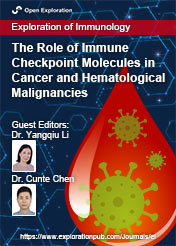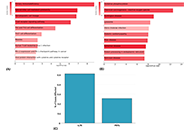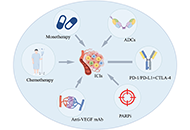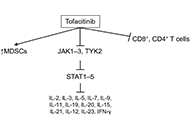
The Role of Immune Checkpoint Molecules in Cancer and Hematological Malignancies
Guest Editors
Dr. Yangqiu Li E-Mail
Professor of Medicine and the Director of Institute of Hematology, School of Medicine, and PI of Key Laboratory for Regenerative Medicine of Ministry of Education, Jinan University in Guangzhou, China
Research Keywords: T cell immunosuppressive, immune reconstruction, anti-leukemia cellular immune based on T cell repertoire characterization, molecular characterization of gene alterations, targeted therapy in T cell malignancies
Dr. Cunte Chen E-Mail
Department of Hematology, Guangzhou First People’s Hospital, School of Medicine, South China University of Technology, Guangzhou, China
Research Keywords: T cell receptor, T cell immunosuppressive, molecular characterization of gene alterations, targeted therapy in T cell malignancies
About the Special lssue
Immune escape is an important factor leading to progression and poor clinical outcome in patients with hematological malignancies or cancer. The primary reason for immune escape is down-regulation of immune cell function, which is mainly manifested as immune cell exhaustion. This exhaustion included high expression of immune checkpoint (IC) molecules as well as high expression of IC ligands on tumor cells. IC molecules include programmed cell death 1 (PD-1), PD ligand 1 (PD-L1), PD ligand 2 (PD-L2), cytotoxic T-lymphocyte associated protein 4 (CTLA-4), T cell immunoglobulin domain and mucin domain-3 (TIM-3), lymphocyte-activation gene 3 (LAG-3), and T cell immunoreceptor with Ig and ITIM domains (TIGIT), CD276, and so on. IC molecules have been confirmed to be upregulated in hematological malignancies or cancer and have an association with clinical outcome. However, the expression patterns, genetic alterations and prognostic value of IC molecules in patients with hematological malignancies or cancer still not be fully explored.
More importantly, inhibitors of PD-1, PD-L1, and CTLA4, etc. have been approved to treat a variety of malignancies (e.g. melanoma, B-cell lymphoma, and non-small cell lung cancer). However, there are still some patients who have no clinical response to IC inhibitors. Therefore, further research is needed to enhance our understanding of the regulation of IC molecules and related signaling pathways. This includes the regulatory effects of long chain non coding RNAs, miRNAs, transcription factors, and other factors on IC molecules, as well as the involvement of major signaling pathways such as MAPK, PI3K, and NF-KB in regulating the expression of IC molecules in immune cells and cancer cells. These (and future discovered) regulatory molecules and signaling pathways may lead to the development of novel strategies to regulate the expression of IC molecules, thereby enhancing the anti-cancer immune response.
This research topic aims are to summarize the role of immune checkpoint molecules in hematological malignancies or cancer and also to explore the underlying mechanisms of immune checkpoint molecules.
In this Special Issue "The role of immune checkpoint molecules in hematological malignancies or cancer", we welcome original articles, reviews, case reports, preclinical and clinical studies related to immune checkpoint molecules.
Keywords: Immune checkpoint, T cell exhaustion, hematological malignancy, cancer
Published Articles


